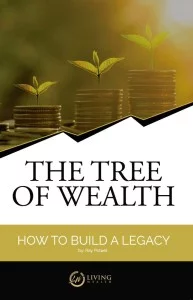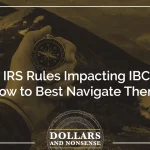In this episode, we will discuss the three biggest wealth destroyers and also give you ideas of how to break free from their clutches.
So much money is leaking from three areas that we’re going to discuss. If people knew what was going on with their money that they’re earning and saving, they’d be mortified.
Bottom line: Taxes are the largest destroyers of wealth. But there is also a slew of other rats eating at your money. And sadly, most people don’t even pay attention to them or know they exist.
So we’ll bring things to light and share with you how to protect yourself today.
Wealth Destroyers Identified and Topics Discussed
- The taxes secretly robbing you blind
- The 1.8 Million Dollar opportunity cost
- Hidden impact of taxes on retirement programs
- The sneaky money thief: inflation
- How inflation becomes a compounding problem
- Fractional Reserve Banking’s effect on inflation
- Credit Cards
- Hidden fees in retirement programs
- Hidden fees in mutual funds
Want Financial Freedom?

Start your journey to financial freedom with this first step.
Get our 122 page eBook The Tree of Wealth here now.
Podcast transcript for episode 18: 3 Largest Wealth Destroyers
Nate: In this episode we will discuss the three biggest destroyers of wealth and also give you ideas of how to break free from their clutches. She is Holly and she helps people find financial freedom.
Holly: He is Nate, he makes sense out of money. This is Dollars and Nonsense, if you follow the herd you will be slaughtered, Episode 18.
Nate: All right, this is a really powerful episode that if people really knew what was going on with their wealth, with the money that they’re earning and the money that they’re keeping, if we really knew how so much money was leaking in these three areas that we’re going to discuss it would change, really everything about them. Holly, what is the number one destroyer of wealth that’s around?
Holly: Bottom line it’s taxes, all of us in some way or another pay taxes. I say all the time it’s the biggest robber of your wealth because you basically earned the money, worked hard for that money, and then somebody that didn’t earn it all gets to get a portion of it. However much they want they get to decide, you get to pay, irregardless of the fact that they never worked one hour for any of that money. They never did anything to earn the money, you just get to pay it.
Nate: Right, taxes on income, taxes on investment gains, taxes on retirement program distributions.
Holly: You own a savings account at the bank and you get tax from the growth of it.
Nate: It’s just money just disappearing to the government, who knows what they do with it, but I wish I could still have … I actually ran some numbers before our appointment today, and for an average family making around a $100,000 of income you very easily can be paying $20,000 a year in taxes, in federal tax, state tax, social security tax. It would be easy for you to be at the $20,000 a year amount in just taxes. I ran the numbers, if you were 30 and you were to be making a $100,000 a year at that time, paying $20,000 a year in taxes between you and your spouse let’s say, and you were to have that tax just go to zero and you could pocket the 20 grand and let’s say put it into a banking policy that Holly and I do, that’s where we have all of our money so that’s what I’ll use as a reference. You put $20,000 a year into that for the next 35 years, you would have $1.8 million that has disappeared from your family because of taxation.
Holly: It’s not that you put $1.8 million it’s that what you lost, your family lost from the growth of that money on the money that the Federal Government is using it for or for state or whatever it is. I’m going to say that Nate was really conservative with the $20,000 because it does really vary on what state you’re in. But if you think of for the rest of your life the government is getting one-fifth of the income that you make, and that they’re doing it with whatever they want, wouldn’t you be upset and don’t you in some ways want that money back? Don’t you want to be able to leave a legacy for your family? I mean, $1.8 million to me is, that’s a legacy if something should happen that you’ve left your family.
Nate: That’s just simply by taking the money the government has taken from us and you being able to build wealth with it. Taxes are just the biggest destroyer of wealth around. If we were to reduce taxes everybody can be wealthier, and I sure wish we would. Before 1913 there was no income tax. No income tax, everyone got along fine. The Federal Government was funded and then they imposed the income tax and increased it practically every year since then, and frankly only been reduced a couple of times in history really. It is constantly increasing as the government wants more and more, which just means we have less and less, and that’s just on the income tax side, Holly.
We know in the financial business taxes can destroy what you think you have in your, let’s say in your retirement program. If you have a million dollars in retirement program that you think that’s a million, but after the government’s done that’s only $750,000 or less. Because as you distribute money from a retirement program you got to pay taxes on it. It looks like you have a million, but you don’t actually have a million, some of that doesn’t even belong to you.
Holly: If you want to take it out early or use it or anything like that, guess what? You’ll lose even more money.
Nate: Now there’s a penalty on top. I mean, man, taxes, they are just by far the biggest destroyer of wealth, which is why it’s so powerful to get out of a taxable environment and go into a life insurance policy which has existed before the income tax, it grows income tax-free and can be used income tax-free. We probably won’t be able to bypass income taxes on your income, though we wish we would for everybody, but we can at least start moving money into an environment that grows tax-free so we won’t have to worry about that later.
Holly: Even with taxes, Nate, and like what you said with let’s say you make a $100,000 and then $20,000 goes to the government for taxes that you’re going to lose per year. You can create wealth or a way to pay your income taxes through the life insurance policies and by just moving money over when taxes are due to be able to pay that, because even I don’t like to pay my taxes. I’m going to be honest, I dread it, but now that there’s a program in place it’s actually a lot easier for me, because I know that I’ve figured out a system and a way to save money to be able to pay my income tax, but still have tax-free growth for the future when taxes rise, so that I’m never stuck in a position where I don’t have the money.
It’s crazy if you can’t pay your income tax because maybe you truly didn’t make enough or you didn’t live within your means or where you live it’s so expensive to live that literally every dollar was spent on providing for needs, then you’ll have to pay 10% interest to the Federal Government to pay your taxes.
Nate: I know, they really stick it to you. They really do. The amount of wealth that’s lost because of taxes is unbelievable and as you said, with the way that national debt is compounding exponentially every year, not only does the government run in a deficit, we’re not making a dent in the debt because every year we add like a trillion dollars to it. If we honestly think taxes are truly going to be going down for a long period of time it’s seemingly less and less unlikely that taxes in the future are going to be lower than they are today.
Holly: Well, absolutely, because the last time our taxes were ever lowered was when Ronald Reagan was the president. That was the last time taxes have ever been decreased, ever since then they’ve increased. Chances are that in our lifetime we’re never going to see a decrease in the taxes, we’re only going to see an increase. Like Nate said, when we’re adding to the deficit every year, we’re not even paying the interests with our taxes basically on the debt that we owe.
Nate: We’re literally borrowing money to pay the interests. I mean, that was the big crisis that was politicized, the debt ceiling crisis that we have to raise our debt ceiling or else we can’t pay our bills. What they were saying was, “We don’t have enough money to pay the debts that we already have. We need to go borrow more money to pay the people we already owe money to.” That is the world we live in and that is scary for the future.
Holly: The only way really to change that is really if our government is going to shrink or they’re actually going to start tackling the debt. It’s crazy that we have such a big debt yet we, as individuals, we have to pay our debts, right, Nate? We have to pay them. We have to pay our taxes. It’s amazing though that our Federal Government can just keep increasing the ceiling or keep borrowing more money for the debt they already can’t pay.
Nate: I know. It’s one thing to pay taxes if your government is actually a good steward of the money you send. If they can’t even figure out how to live within their means, with the trillions of dollars we give them in tax revenue every year, until they can actually prove to us that they know what they’re doing with the money, and they’re actually doing benefits and they can live with what they’re taking, why would we want them to ever take anymore than they are?
I mean, if this was a patriotic thing and we’re trying to get the government out of a hole that wasn’t there for a brief minute that’s one thing, but to just continually get into more and more and more debt and then keep asking for more and more tax, there’s no way that the people are ever going to be willing or enjoying the fact that the government has no idea what they’re doing with your money. They can’t even steward what’s given to them even though it’s trillions and trillions of dollars.
Holly: I mean, Nate, I live in the highest taxed state in the US, California now, we are the highest taxed state. I’m just amazed that the number of people that live here and the amount of money that’s paid in taxes and yet … or even state governments can’t balance their budget. We got to keep borrowing money as a state from the Federal Government to sustain the state. It’s insane.
Nate: It’s a total shame but that’s why we’re such big promoters of this whole banking concept using life insurance, because we can get this much money as we can into a tax-free environment where we don’t owe taxes on the gains. That way one day our hope is that we can start living from the profits the policy make us and just be done with the taxman, who is by far the greatest eroder of wealth that exist today. That’s the first and the biggest one. The second biggest destroyer of wealth, Holly, is inflation. Now how is that destroying our wealth?
Holly: I’ll just say this, that what I could buy for $5 five years ago I can’t buy for $5 today. Inflation basically, our dollar is getting weaker and weaker and weaker, and as it gets weaker we keep giving strong dollars to the Federal Government or other people and yet in exchange, and I’m going to use retirement programs, we might say, “Hey, we put a million dollars into that retirement program or we put $200,000 into that retirement program.” But if you go to retire in 20 or 30 years, let’s say you’re 30 you got to retire at 59 and a half or 60, that’s 30 years you put money in. That same money that you put in when you were 30 years old will not buy you even half of what it will in 30 years. The million dollars really is maybe $500,000 or $200,000, because really the costs of living is going to have gotten up so high you won’t be able to save enough money to live on later on in life.
Nate: Exactly, and that’s why Ray, the founder of Living Wealth and our mentor, Holly, he talks about if you were to write down on the screen 3 + 3 + 3 = 9, that’s correct no matter where you’re from, 3 + 3 + 3 is always equal to 9, but if you were to just simply put a dollar sign $3 + $3 + $3, that same $9 that that’s equal to is not the same no matter where you are. $9 in Mexico can buy you a lot more than it can in the US. $9 in … In other words, when you put money in to the game math doesn’t work that way, they want us to think it does so they say, “Hey look, 40 years from now you’ll be a millionaire.” What they don’t know when they tell you is the fact that that million dollars that you would have in the 401K or whatever it is, is not actually worth the million you think it is. It’s probably, as you said, worth $400,000 or something like that in today’s money.
Inflation also is a compounding thing. Every year inflation compounds upon the last year, it’s erasing people’s wealth and it’s actually harming, as you said Holly, those who want to save and it’s encouraging to spend the good dollars right now because the money is not going to be worth as much down the line.
Holly: Well, really what we’ve been taught, Nate, is what you said. We’ve been taught that money is the same as math, that $9 is the same as the number 9 and it’s not. We’ve been taught to take those good strong dollars today. There’s dollars that will buy more today than they will in the future and we’ve been taught to put them into the retirement programs, to give them over to the government, to the banks, to let them use those strong dollars today. We’ve said here, “I’ll take the weak dollars in the future,” but nobody ever told us they were weaker. What we’ve taught to believe is it’s the same dollars and it’s not .
Nate: The biggest culprit of this inflationary period of money getting weaker and weaker every year is the banks. It is the fractional reserve banking system and the Federal Reserve, whose system we live in that is really the biggest cause of inflation. Because they are printing money that didn’t exists before and the banks, every time we make a deposit, our lending 10 times, they’re creating money out of thin air. It’s this creation of money out of thin air that’s causing … As the money supplies starts to increase drastically because of these banks and the practices that they work in, as they increase the money supply that means the value of the dollars that you already have, it’s weaker because there’s just so much more on the marketplace now. That’s what banks love though, is that it puts them in a good position, they get to earn interest off money that doesn’t exist. They’re the only thing in the world that can pretend like there’s money when there’s actually not money.
Holly: We’re going to hear a note from our sponsor. Just a reminder the first two destroyers of wealth are taxes and inflations, and you’re going to hear about the third one when we return.
Nate: Are you tired of being stressed about money? The Dollars and Nonsense podcast is sponsored by Living Wealth. You can visit livingwealth.com/freedom to get your free Smart Money eBook and sign up for a personal wealth presentation today. Living Wealth is a family-owned and operated business which works with individuals, families, and even small businesses to slay the money stress dragon. Our clients receive individual coaching regarding wealth creation and how to create a retirement income. You’ll be enabled to have cash today and in the future. Since 1972 Living Wealth has been committed to educating smart people on basic money principles to assist them in becoming debt free and finally find financial freedom. Let us help set you free. Remember to visit livingwealth.com/freedom to receive your free eBook and even sign up for an individual wealth presentation today.
All right, now we are ready for the third and final big destroyer of wealth and that is fees. Fees. Now, Holly, what do we mean when we say fees?
Holly: It’s all those little hidden costs that aren’t explained to you whether it be when you don’t pay your credit card completely or when you have to go to the bank and you need to get a cashier’s check because they don’t have enough cash on hand and so you have to pay a fee. Basically, I say they’re not in print or they’re in such small print and you never see it there. Fees can be anything that you are charged for a service or goods even though maybe you’re using your own money or trying to access your own money to get it.
Nate: Many times fees, as you were mentioning occur in the financial world, that’s really what we’re talking about like the overdraft fee or a credit card late payment fee. Then probably the biggest fee that is hidden, I guess I would say, is how much money people really lose in their mutual funds and retirement programs to the money managers. A lot of people have no idea how much money is literally just leaking out of your 401K every year in a management fee, and many times you have no idea what that amount is, and they don’t even really do a good job making it easy to figure out what fees you’re actually paying. In that world there is normally a percentage fee, 1%, 2%, something like that of the amount of money inside the program. That essentially means that if your 401K fee is 2%, which is normally pretty average that means your account has to earn 2% just to pay for the fee. You could have had a 1% rate of return and literally have less money this year than you had the year before.
Holly: Well, I think too it’s understanding too that even if it’s only 5% you’re not getting 5% on your money. You really aren’t because the fees are hidden and they don’t just come out and tell you, “Hey, this is the fee that we’re charging you.” Now they have had to with other not 401Ks, but with other programs they’ve had to start saying, “This is how much the fees are,” and publishing that.
Nate: Holly, they are doing a better job. The government’s coming in forcing these people to quit hiding in the shadows what fees they’re actually charging. You’re right, they are actually getting a lot better at that.
Holly: But it’s not actually published anywhere, you won’t see a 2%, what you will see … Just ’cause I had clients what they showed as they got their 401K, their annual summary report and stuff, and at the bottom it was the fees and there was an amount there. They had to go in … You had to go in and calculate how much actually was the fee for that year. It was 2%, but they had to go back and look at it, they didn’t know what it was. They just had a dollar amount and what the fees where.
Nate: Honestly, I worry that sometimes those dollar amounts aren’t even correct because there are still, I believe, hidden fees that aren’t even shown necessarily in the performa or whatever it is and you’ll notice. I mean if you had a 2% fee on your 401K, what people don’t realize is that not only are you paying a fee each year, your fees compound as your account compounds. Your fees get more and more and the fact that that money that they’re taking out on a fee can’t be earning for you, the missed opportunity, just like we talked about the taxes earlier, with $20,000 a year in taxes you’re out $1.8 million. Fees can be almost that bad as time goes on not only in the amount of fees you pay, but in the missed wealth that that money could have built you had it not disappeared from your account. It can easily be 500 to a $1 million, $500,000 to a $1 million over somebody’s life, not only in the amount of fees, but in what those fees should have earned you if you weren’t paying exorbitant money management fees.
Holly: Well, and Nate, just as an example is, “What does a bank make on fees?” Take Wells Fargo, Bank of America, Chase, US Bank, Credit Unions, they make money off of you every year in fees. Ballpark figure, Nate, what do you think they make in fees?
Nate: Ballpark, it’s got to be, like a Wells Fargo Bank a $100 million in that range. I don’t know. Do you know, Holly, what it is?
Holly: Well, I know that in 2008 during the banking crisis they made $4 million or $8 million depending on the bank on fees, just fees. That’s when you go use an ATM that didn’t belong to your bank so you got to pay the ATM fee, servicing fee of $2.50. That’s like $30 for a wire transfer at the bank maybe, just to transfer money from one bank account to another because of the amount of it. I mean cashier’s checks are anywhere from $20 to $35. There’s all these fees associated with you being able to use your own money. To think that banks don’t make money.
I would say nowadays I think it’s over, you know, a $100 million. I would say somewhere in the billion that they’re making off of our money. Basically our deposits which we’re loaning to them and then they’re charging us to use our money. Really, if you think about the money that banks are making on fees alone, like Nate said, overdraft fees, just to have a certain amount of money, just to have the checking account, just to deposit things. I was at the bank the other day, Nate, and somebody had to pay to cash their check at the bank. Now it was cashier’s check from that bank written by the bank on the person’s bank account. The money was there, it’s a cashier’s check, but because the individual didn’t have a bank there they had to pay a fee, $10 fee to cash the check there. I’m like, “But it’s written on your bank, it was your … Your bank issued this cashier’s check. ” But you don’t have a bank account here so you got to go do it to your bank.
Now why do you think they wanted to have the person go to their bank? Because the other bank can hold that money for 48 hours before it’s released. You need to pay the fee to the bank that you’re not … don’t have an account or you go to yours and deposit it there and they hold it for 24 to 48 hours before you can access it. It’s a way to limit you from getting your money, but it’s all with fees, all of it is fees tied into it. It’s crazy what we spend in fees.
We just bought a car and I went through in detail the cost with taxes like you said and all that, a non- governmental taxes and fees that we had to pay for this electronic this and this electronic that just to get the car, we ended up spending over $400 in fees just to the dealership on nothing that was governmental, but that’s the fee it is for this or that just to go get the car.
Nate: You can even think of interests as really a fee and if we start including that the amount of money people pay in interest over their lives could rival the taxes. Honestly it could easily rival, if not exceed for some people, the amount of interest you pay or a financing fee to be able to borrow money. Now you have actual fees involved with mortgages and things like that, but even just the interest is kind of a fee as well or similar to it.
Taxes, inflation and fees rob people of enormous amounts of wealth. You’ve got to get away from that, and that’s why we love banking is that we don’t have to lock money up and fall prey to inflation, we can use it today. It grows tax-free so that there will be a day where maybe we can be … have all of our income coming from policies no tax, that would be great. That’s the goal really.
Then also with fees, there are no management fees that are growing exponentially along with your policy and actually fees get lower and lower instead of bigger and bigger. We can really lower the fees, but then also because it’s your own bank there’s no fees for it. When you borrow you get to pay yourself back the interest. There’s no loan processing fees and all that. You can get rid of a lot of the bank fees that are associated with most people. Anytime you can get rid of a fee you got more money that can actually build wealth for you, anytime you don’t get rid of a fee it’s just literally money that disappears for nothing.
Holly: Well, and that’s the key there, is that through the banking process and through a policy being set-up the right way and the correct way you can actually, like Nate said, you can get to a place where you live tax- free. Yes, you still have to pay taxes, but the growth of that money is what’s going to pay for your taxes. You can get rid of inflation because you’re going to use your strong dollars today. You’re going to swap places with the banks and the retirement programs, like what they’re getting us to do, “You give your dollars today and we’ll give you weak dollars in the future.” You’re actually able to switch places and just those fees that you don’t have a fee for taking a loan out. You don’t have a fee for making your premium, there’s not a fee associated with it. When you want to take your money you can actually do that and not get charged.
Nate: If you can focus on reducing the overall tax burden you have, reducing the effects of inflation and reducing the amount of fees you pay, if we can just focus on those you can do a lot more without even having to increase your income, just only by getting rid of the leaks. That’s what we wanted to share today, the three biggest destroyers of wealth are taxes, inflation, and fees. Your goal should be to try to get rid of those as much as you can out of your life, that will help you on your wealth-building journey. This has been Dollars and Nonsense, if you follow the herd you will get slaughtered.
Holly: Get free resources and transcripts from this episode by visiting livingwealth.com/e18.









